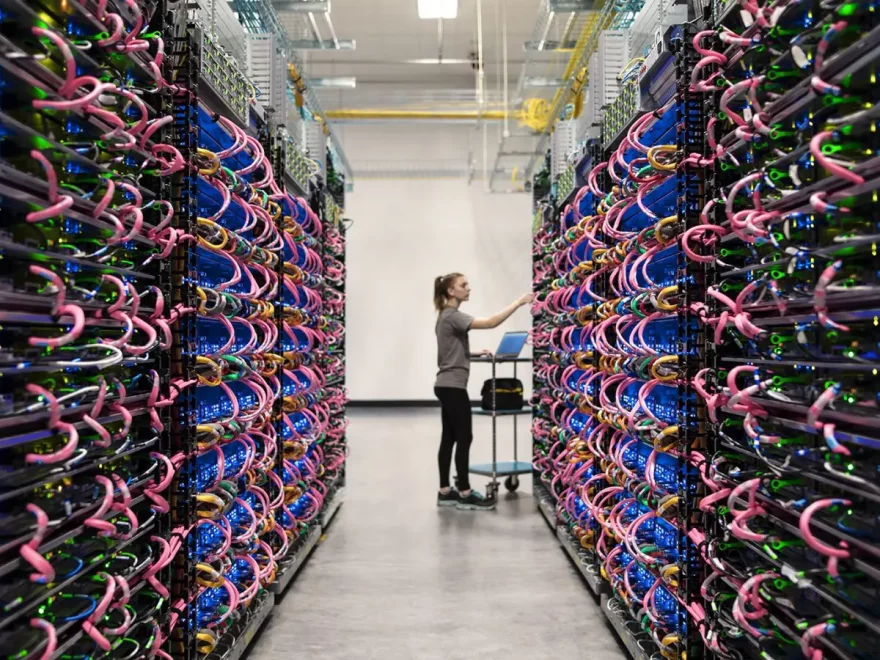The challenge for many of today's companies is migration of your data centers to the cloud. Having these infrastructures, platforms or software systems allows users to access their data over the Internet, without having to download additional software. In addition to running workloads within a cloud-only environment.
AWS and Google Cloud Platform They are two of the most important cloud services in the world, and in this post we will focus on explaining how each one works, the benefits and the differences that exist between the two.
What is AWS?
Amazon Web Services (AWS) is a cloud service provider, which allows us to have storage, computing resources, mobile applications and/or databases in cloud computing.
It works with a monthly subscription to AWS, which allows connect to servers, databases, services where information is processed that is needed, instead of having to invest in expensive and powerful computers.
This type of resource has many advantages both for SMEs and companies that are young and cannot afford to invest massively in infrastructure, and for those larger ones that, even having infrastructure, choose to work in a flexible, scalable, secure and cost-effective. Since, for example, it allows it to be translated into a variable cost that only increases if more capacity is required, that is, if the business grows or decreases in the event of any eventuality.
What is Google Cloud?
Google Cloud (also known as Google Cloud Platform or GCP) is a provider of cloud computing resources used to develop, implement and operate web applications.
Acts as a complete infrastructure with a series of functions and tools that allow companies to manage and complete digital security, obtaining more efficient management.
Google Cloud Platform has more than 100 products and services dedicated to new opportunities in infrastructure, analytics, ML/AI and business solutions. These and other functions provided by the platform collaborate with companies making them more scalable.
KEY DIFFERENCE: Google Cloud vs AWS
Google Cloud (GCP) and Amazon Web Services (AWS) are two powerful cloud service providers that offer a range of computing solutions, and where the common thing is Pay only for the use of cloud services.
Below is a table of differences between Google Cloud and Amazon Web Services:
| Main differences | GCP | AWS |
|---|---|---|
| Cost | Google's free tiers They have no time limit | Amazon's free tiers have a maximum validity of 12 months and subsequent charges based on usage |
| Computer Service | Compute Engine (IaaS), App Engine (PaaS), Kubernetes Engine (container), Cloud Functions (serverless functions), Microservices and Google APIs | Amazon Elastic Compute Cloud (IaaS), Elastic Beanstalk (PaaS), Elastic Compute Cloud Container Service (container), AWS Lambda (serverless functions) |
| Database services | Google Cloud SQL (RDBMS), Google Cloud Datastore, Google Cloud Bigtable (NoSQL key-value), Google Cloud Datastore (NoSQL: indexed), Firebase, Cloud Spanner | Amazon Relational Database Service (RDBMS), Amazon DynamoDB (NoSQL key-value), Amazon SimpleDB (indexed NoSQL), Amazon Aurora |
| Storage services | Google Cloud Storage (object storage), Google Compute Engine persistent disks (block storage), ZFS/Avere (file storage), Google Cloud Storage (cold storage) | Amazon Simple Storage Service (object storage), Amazon Elastic Block Store (block storage), Amazon Elastic File System (file storage), Amazon Glacier (cold storage) |
| Network services | Virtual private cloud, Cloud Load Balancer, Google Cloud Interconnect, Google Cloud DNS, Own infrastructure | Amazon Virtual Private Cloud, Elastic Load Balancer, Direct Connect, Amazon Route 53 |
| Management services | Stackdriver Monitoring (monitoring), Google Cloud Deployment Manager (deployment) | Amazon CloudWatch (monitoring), AWS CloudFormation (deployment) |
| AI/ML Support | Cloud Machine Learning Engine, Dialogflow Enterprise Edition, Cloud Natural Language, Cloud Speech API, Cloud Translation API, Cloud Video Intelligence, Cloud Job Discovery | SageMaker, Comprehend, Lex, Polly, Rekognition, Machine Learning, Translate, Transcribe, DeepLens, Deep Learning AMI, Apache MXNet, TensorFlow |
| Instance customization | Google Cloud Platform provides a wide range of customization for any instance | AWS offers a limited customization |
Google Cloud offers paid billing models per second that allow users save much more than with AWS or Azure. Google also offers several discounts to help customers save up to 50 percent in some cases compared to AWS, allowing users to take advantage of these technology solutions and adapt them within their operations and/or processes to improve their automations and be more efficient.
Why AWS?
Depending on the needs of each user, both cloud providers have a series of advantages and benefits to highlight. Here we share those from AWS:
![]() Amazon Web Services (AWS) is Easy to use, has an adapted design so that users can quickly host their applications.
Amazon Web Services (AWS) is Easy to use, has an adapted design so that users can quickly host their applications.
![]() Is flexible since it allows you to select the services that are necessary, such as the operating system or databases.
Is flexible since it allows you to select the services that are necessary, such as the operating system or databases.
![]() Secure infrastructure, including physical, operational and software measures.
Secure infrastructure, including physical, operational and software measures.
![]() Scalability and performance thanks to the tools provided by AWS, which allow the application to scale up or down based on demand.
Scalability and performance thanks to the tools provided by AWS, which allow the application to scale up or down based on demand.
Why Google Cloud?
These are the main advantages and benefits of choosing Google Cloud Platform as a cloud provider:
GCP frees users from operating expenses related to infrastructure management, server provisioning and network configuration. This way, your company's innovators and programmers can dedicate themselves to the specific tasks of their function.
It allows you to enhance data-driven transformation since it is unmatched in terms of speed, scale and security.
Google Cloud is the most secure platform From the market. Security is provided through progressive layers that make up a true defense system at scale.
The price Of all its services it is the most competitive compared to the competition.
With GCP you can migrate data in real time to virtual machines with automatic backups.
Google BigQuery is a key GCP data storage tool, which solves the problem of not having the necessary infrastructure to host, organize and analyze large amounts of information.
AWS Features
Some of the most important features of Amazon Web Services (AWS) are:
![]() Offers centralized billing and management.
Offers centralized billing and management.
![]() It allows you to deploy your application in various regions of the world.
It allows you to deploy your application in various regions of the world.
![]() Offers cloud-based disaster recovery services.
Offers cloud-based disaster recovery services.
![]() It has been in the market for much longer offering cloud services.
It has been in the market for much longer offering cloud services.
Google Cloud Features
Some of the most important features of Google Cloud Platform (GCP) are:
![]() Constantly includes more languages and operating systems.
Constantly includes more languages and operating systems.
![]() A better user interface that helps improve the user experience.
A better user interface that helps improve the user experience.
![]() Offers self-service on demand.
Offers self-service on demand.
![]() Resource pooling and rapid elasticity.
Resource pooling and rapid elasticity.
![]() Competitive prices compared to other cloud services.
Competitive prices compared to other cloud services.
![]() Offers out-of-the-box DRP or backup services.
Offers out-of-the-box DRP or backup services.
![]() It allows you to deploy your application in various regions of the world.
It allows you to deploy your application in various regions of the world.
AWS vs Google Cloud Platform (GCP)
| Main differences | GCP | AWS |
|---|---|---|
| Release date | 2015 | 2018 |
| Billing Type | Direct and transparent; through partners or directly with Google | Full visibility in direct contracting, opaque through a partner |
| Private network | Google has the largest fiber optic network interconnecting all regions of its cloud | Mainly uses public networks |
| Security | It maintains a shared responsibility model but establishes immovable minimums (information encrypted at all times) | Maintains a shared responsibility model without restrictions, which can generate risks under certain conditions |
| Learning curve | Fast (lots of documentation and easy-to-adopt services) | Medium (lots of documentation, larger user community) |
How to choose your cloud?
- Security: It is essential that the cloud provider offers security measures, since companies that are going to migrate data to the cloud must be protected from potential cybersecurity threats and incidents. Therefore, it is necessary to check what type of protection the cloud service provider offers.
- Scalability: It is very important to know what computing power the cloud provider offers, for the scalability of the technological solutions that are intended to be hosted in its infrastructure, in accordance with the requirements demanded by the operation, thus providing reliability for the acquisition of the service.
- SLA: They are necessary not only to define how customer data is processed and hosted, but also to define the level of service transparency that the customer can expect from the cloud service provider. Helps define expectations and outcomes of service delivery.
- Location: Geographic distribution is important to distribute risks, especially in relation to natural disasters, as well as to meet regional eligibility requirements for data location. For example, in some areas there are requirements that data does not go beyond region boundaries, requiring the service provider to have physical facilities in the region.
- Support and support: Consult the attention of the technical support and technical documentation on the technologies offered. The company may need it at any time. Flexibility to deal with unexpected events is essential and should definitely influence choosing the most helpful and efficient service provider.
As we have seen, the cloud computing market is on the rise and the leaders who have the highest percentage of spending on cloud infrastructure are Google Cloud Platform and AWS. It is important to understand how each cloud focuses its business, to better adapt its use to the needs of your own company. If you want to know more about the cloud services and benefits, write to us and our specialists will contact you.



